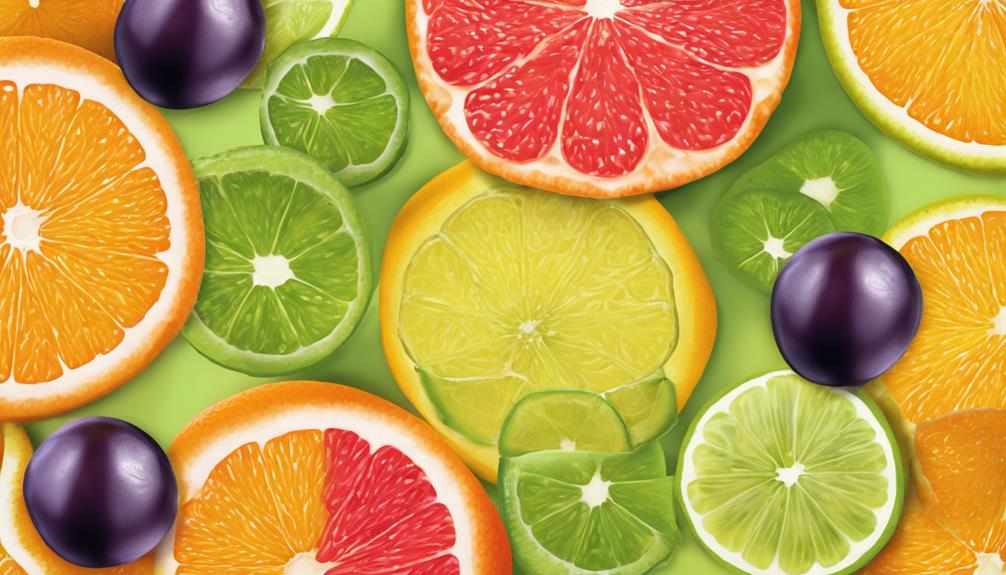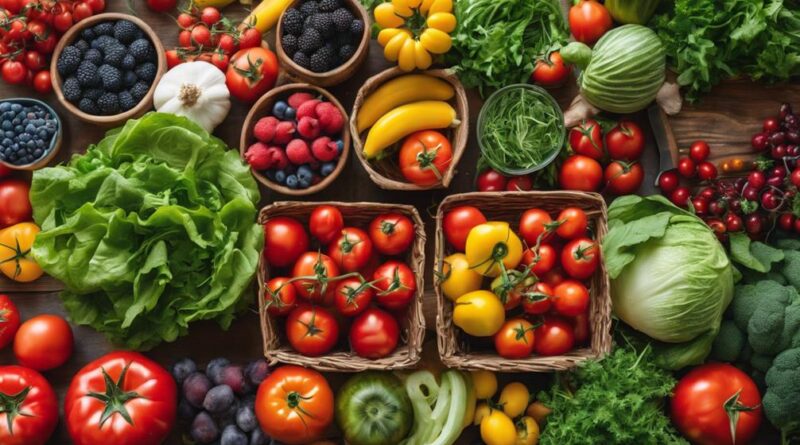What Are the Top Vegetarian Foods Grown Naturally?
Explore a variety of top vegetarian foods naturally cultivated for your well-being. Indulge in leafy greens like spinach and kale for essential nutrients. Discover the power of cruciferous vegetables such as broccoli and Brussels sprouts, packed with health benefits. Embrace protein-rich legumes like lentils and chickpeas for improved digestion. Savor the antioxidant-rich goodness of berries like strawberries and blueberries. Dive into nutrient-dense whole grains such as quinoa and brown rice for fiber and protein. Incorporate nuts and seeds for plant-based protein and omega-3s. Don't forget the vitamin C boost from citrus fruits and the nutrient-rich profiles of root vegetables for a fulfilling vegetarian diet.
Leafy Greens
Delivering essential nutrients and a burst of freshness, leafy greens are a powerhouse in the world of vegetarian foods. Spinach salads and kale smoothies are just the beginning of the culinary adventures you can embark on with these versatile greens. Spinach, rich in iron and vitamins A and C, can be the star of a refreshing salad or blended into a nutrient-packed smoothie for a quick and healthy meal. Kale, a superfood loaded with antioxidants and fiber, can elevate your morning routine with a vibrant green smoothie that will leave you feeling energized and ready to take on the day.
When it comes to leafy greens, Swiss chard recipes and arugula dishes offer a range of flavors and textures to explore. Swiss chard, with its colorful stems and earthy taste, can be sautéed with garlic and olive oil for a simple yet delicious side dish. Arugula, known for its peppery kick, adds a bold flavor to salads and pastas, making it a popular choice for those looking to spice up their meals.
Incorporating leafy greens into your diet not only introduces a variety of tastes but also provides a plethora of health benefits. Whether you're enjoying a refreshing spinach salad or blending up a kale smoothie, these nutrient-dense greens are sure to become staples in your vegetarian culinary repertoire.
Cruciferous Vegetables
Cruciferous vegetables, known for their unique flavors and impressive health benefits, are a must-have in any vegetarian diet. These veggies, including broccoli, cauliflower, Brussels sprouts, and kale, offer a wide array of nutrients that can support overall well-being.
Broccoli is a standout cruciferous vegetable, packed with vitamins, minerals, and antioxidants. It's known for its cancer-fighting properties, high fiber content aiding in digestion, and its ability to promote heart health. Incorporating broccoli into your meals provides a range of benefits, making it a versatile and nutritious addition to any vegetarian diet.
On the other hand, cauliflower offers a blank canvas for creating various vegetarian dishes. From cauliflower rice to buffalo cauliflower 'wings,' this cruciferous veggie is incredibly versatile and can be a satisfying substitute for higher-carb foods.
When it comes to Brussels sprouts, they're a nutritional powerhouse rich in fiber, vitamins, and minerals. These mini cabbages are low in calories and high in antioxidants, making them a great addition to any vegetarian meal.
Additionally, kale, with its different varieties like curly kale and Lacinato kale, is a nutrient-dense green that can be enjoyed raw in salads, sautéed as a side dish, or blended into smoothies for an added nutritional boost. Incorporating these cruciferous vegetables into your vegetarian diet can enhance its nutritional value and provide a delicious array of flavors.
Legumes
Legumes, known for their rich protein content and versatile culinary uses, are essential components of a well-rounded vegetarian diet. These protein-packed legumes aren't only nutritious but also offer a wide range of health benefits. Lentils, chickpeas, black beans, and edamame are just a few examples of legumes that can easily be incorporated into your daily meals.
When it comes to preparing legumes, the possibilities are endless. From hearty soups and stews to flavorful salads and dips, there are countless versatile legume recipes to explore. Consider making a spicy chickpea curry, a comforting lentil soup, or a zesty black bean salad. You can also experiment with different seasonings and cooking methods to create dishes that suit your taste preferences.
In addition to being a great source of plant-based protein, legumes are also high in fiber, vitamins, and minerals. They can help improve digestion, lower cholesterol levels, and regulate blood sugar levels. By including a variety of legumes in your diet, you can enhance your overall health and well-being.
Next time you're planning your meals, remember to include protein-packed legumes for a nutritious and satisfying vegetarian option. Whether you're a seasoned cook or just starting out in the kitchen, legumes are a fantastic ingredient to work with due to their versatility and health benefits.
Berries
Berries, with their vibrant colors and refreshing flavors, are nutrient-rich fruits that offer numerous health benefits when incorporated into your diet. These antioxidant-rich, flavorful berries are a delicious addition to any meal plan. Berries aren't only tasty but also packed with essential vitamins, minerals, and fiber that contribute to overall well-being.
Seasonal berries like strawberries, blueberries, raspberries, and blackberries are widely available and offer a range of health advantages. Strawberries are high in vitamin C and manganese, blueberries are known for their cognitive benefits, raspberries are rich in fiber and antioxidants, and blackberries contain vitamins C and K along with manganese. Including these versatile berries in your diet can help boost your immune system, improve digestion, and provide a natural source of energy.
Whether enjoyed fresh, frozen, or incorporated into smoothies, salads, or desserts, berries offer a delicious way to enhance your meals while promoting good health. Their natural sweetness makes them a popular choice for satisfying cravings for something sweet without added sugars. Next time you're looking for a nutritious snack or ingredient to elevate your dishes, consider reaching for some antioxidant-rich, flavorful berries.
Whole Grains
Whole grains provide a valuable source of essential nutrients and dietary fiber necessary for maintaining a healthy diet and promoting overall wellness. When it comes to vegetarian foods grown naturally, whole grains are a must-have staple in your pantry. Here are some key points to consider when incorporating whole grains into your diet:
- Ancient grains, modern appeal: Ancient grains like quinoa, farro, and amaranth are regaining popularity due to their nutritional benefits and unique flavors. These grains are rich in protein, fiber, and various vitamins and minerals, making them a wholesome choice for vegetarians.
- Gluten-free grains, versatile options: For those following a gluten-free diet, grains like brown rice, buckwheat, and millet offer versatile alternatives. These grains can be used in various dishes, from salads to gluten-free baked goods, providing essential nutrients without compromising on taste.
- High fiber content: Whole grains such as oats, barley, and bulgur are excellent sources of dietary fiber, promoting digestive health and helping you feel full and satisfied. Including these grains in your meals can aid in weight management and reduce the risk of chronic diseases.
- Nutrient-dense choices: Whole grains are packed with essential nutrients like iron, magnesium, and B vitamins, supporting overall health and vitality. By incorporating a variety of whole grains into your diet, you can ensure you're getting a diverse range of nutrients to fuel your body.
- Easy to prepare: Whole grains are simple to cook and can be incorporated into a wide range of dishes, from breakfast porridges to hearty grain bowls. With their versatility and nutritional benefits, whole grains are a convenient and delicious addition to any vegetarian diet.
Nuts and Seeds
When it comes to vegetarian foods grown naturally, a fantastic addition to your diet is incorporating a variety of nuts and seeds. Nuts and seeds aren't only delicious but also pack a powerful nutritional punch, making them excellent choices for nutrient-rich snacks and plant-based protein sources.
Nuts like almonds, walnuts, and cashews are known for their high protein content, healthy fats, fiber, vitamins, and minerals. These make them a perfect snack to keep you satiated between meals while providing essential nutrients for your body. Seeds such as chia seeds, flaxseeds, and pumpkin seeds are also excellent sources of plant-based protein, omega-3 fatty acids, and fiber. They can easily be sprinkled on salads, yogurt, or blended into smoothies to boost your daily nutrient intake.
In addition to their nutritional benefits, nuts and seeds are versatile ingredients that can be used in various recipes, from salads and stir-fries to baked goods and granola bars. They add texture, flavor, and a nutritional boost to any dish. So, next time you're looking for a healthy snack or a plant-based protein option, reach for a handful of nuts or seeds to keep you energized and satisfied throughout the day.
Citrus Fruits

Citrus fruits, renowned for their vibrant flavors and high vitamin C content, are essential additions to a vegetarian diet for their refreshing taste and numerous health benefits. Citrus fruits come in a variety of types, each bringing its unique flavor profile to the table. From sweet oranges to tangy lemons, here are some key points to consider when incorporating citrus fruits into your diet:
- Rich in Vitamin C: Citrus fruits are a powerhouse of vitamin C, a vital nutrient that boosts your immune system and promotes healthy skin.
- Versatile in Recipes: Explore citrus recipes like lemon-infused salads, orange-glazed tofu, or grapefruit salsa for a burst of flavor in your vegetarian meals.
- Seasonal Variations: Enjoy seasonal variations by incorporating fruits like blood oranges in the winter or key limes in the summer to keep your dishes fresh and exciting.
- Cultivation Techniques: Learn about citrus cultivation techniques such as grafting and pruning to ensure a bountiful harvest in your home garden.
- Sustainability Practices: Support sustainable citrus farming practices by choosing organic produce or sourcing from local farmers to reduce your carbon footprint.
Root Vegetables
Root vegetables, known for their earthy flavors and nutrient-rich profiles, are versatile staples in a vegetarian diet, offering a variety of culinary possibilities. Nutritious tubers, such as sweet potatoes, are packed with vitamins A and C, fiber, and antioxidants. These vegetables can be roasted, mashed, or turned into delicious fries, making them a versatile and healthy option for any meal.
Carrots, another member of the root vegetable family, aren't only flavorful bulbs but also incredibly nutritious. They're an excellent source of beta carotene, which the body converts into vitamin A, essential for good vision and a healthy immune system. Carrots can be enjoyed raw as a crunchy snack, cooked in stews and soups, or even juiced for a refreshing beverage.
Beets, with their vibrant color and unique earthy taste, are rich in essential nutrients like folate, manganese, and potassium. These root vegetables can be roasted and added to salads, pickled for a tangy side dish, or blended into a smooth and velvety soup.
Incorporating a variety of root vegetables into your vegetarian diet not only adds depth and flavor to your meals but also provides an array of essential nutrients to support your overall health and well-being.
Conclusion
In conclusion, incorporating a variety of natural vegetarian foods into your diet can provide numerous health benefits.
From leafy greens and cruciferous vegetables to legumes and berries, these plant-based options offer essential nutrients and antioxidants to support overall well-being.
By including whole grains, nuts, seeds, citrus fruits, and root vegetables in your meals, you can enjoy a diverse and delicious array of nutrient-rich foods that promote a healthy lifestyle.
